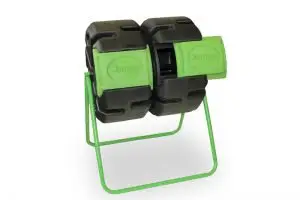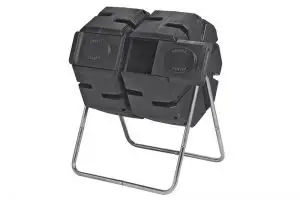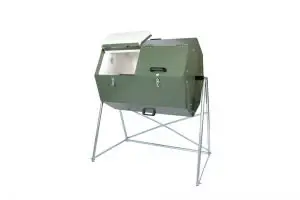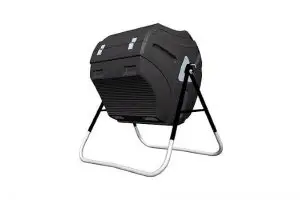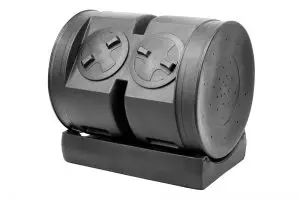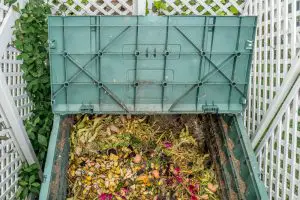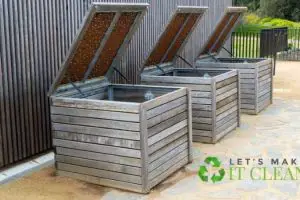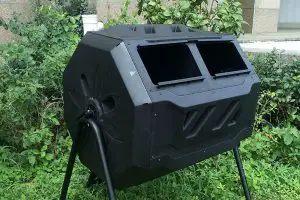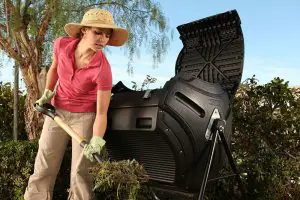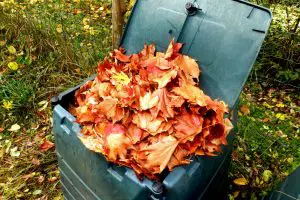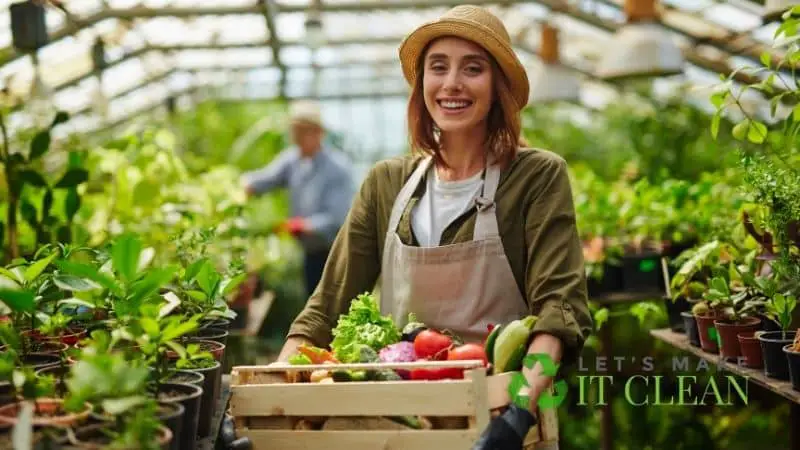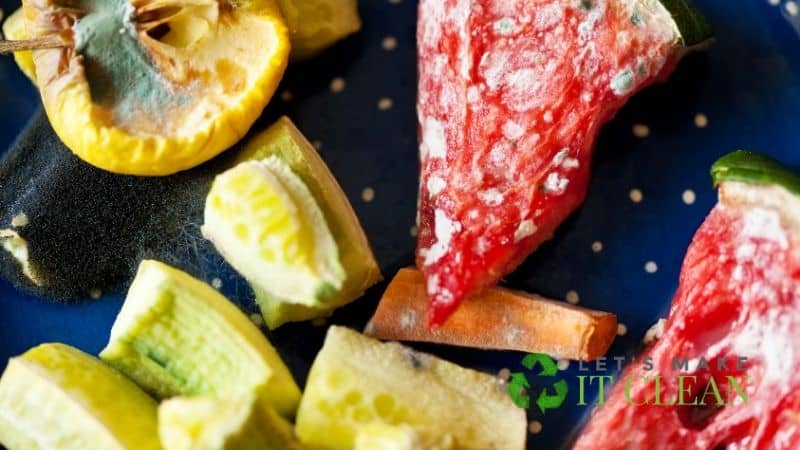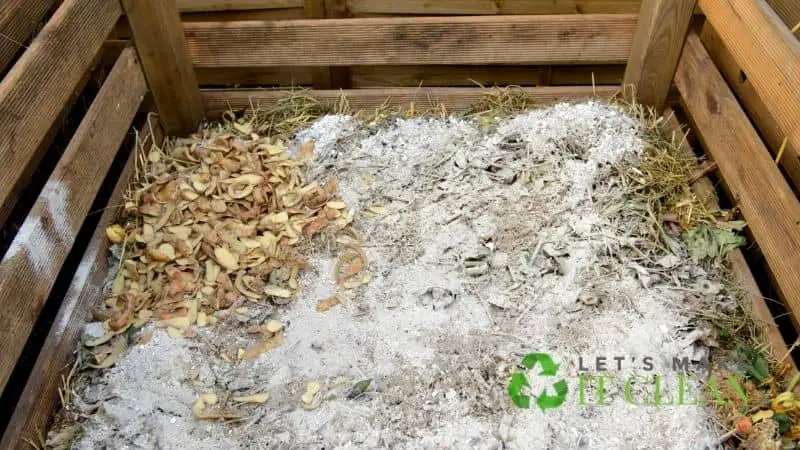A clear distinction between fertilizer and compost is that fertilizer feeds your plants while compost feeds your garden’s soil. When you add fertilizer to your soil, the nutrient level improves.
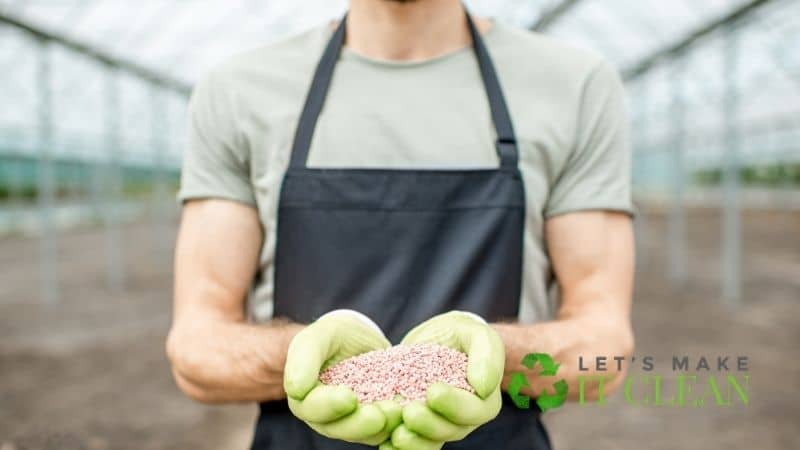
The ingredients of a fertilizer meet the nutritional needs of plants that have a fast-growing rate. Gardeners add compost to the soil in an undefined ratio. On the other hand, fertilizer application has strict application instructions.
Quick Navigation
- Compost vs Fertilizer: What’s the Difference?
- Are Compost and Fertilizer the Same?
- Do You Need Fertilizer if You Use Compost?
- Is Compost the Best Fertilizer?
- What Are the Side Effects of Using Phosphate-based Fertilizers?
- Alternatives to Rock Phosphate
- What Are the Benefits of Bat Guano Fertilizer?
- Final Verdict
Do you ever wonder what the difference between compost and fertilizer is? Both highly benefit your garden, which poses the dilemma: which one will you use in your yard?
It would be best if you created a conducive environment for your plants. To do so, fertilizer application and using compost are an option.
Compost is made from organic material, including plant remnants, vegetable waste, and other materials vital in soil nutrient availability. Fertilizer does not have to be all organic; it can either be chemical or organic.
Here is a more proud understanding of compost vs fertilizer.
Compost vs Fertilizer: What’s the Difference?
The difference between compost and fertilizer is in what each feeds. Fertilizers applied to the garden beds feeds the plants. When you apply compost to your soil, the soil is what is fed rather than the plants.
Nitrogen, carbon, hydrogen, potassium, phosphorus, and oxygen are crucial in plan growth. If you want your plants to have better yields, you have to avail these elements in your soils.
Fertilizer provides nutrients that are hard to come by facilitating healthier plant growth.
Compost benefits the soil food bed in your garden while chemical fertilizers suppliers your soils with additional nutrients. The ingredients in fertilizers meet the needs of crops that grow rapidly.
Are Compost and Fertilizer the Same?
There is a distinction between fertilizer and compost. Nonetheless, compost has fertilizer values, but fertilizer doesn’t have compost values.
Applying synthetic fertilizers to your soils adds more nitrogen, phosphorus, and potassium than when you apply compost. You will need to have additional ingredients such as urea in your compost if you want to have higher macronutrient values.
Once you feed your soils with compost, you create soil conditions that boost plant growth. The soil conditions help to control weeds and pest infestations. The compost application eliminates diseases that attack plants due to poor soil structure and harmful pathogens.
The downside to this method is that the nutrients are slowly released and require more time to feed your plants.
On the brighter side is that one application of compost has the potential to benefit your crops for a longer duration.
Do You Need Fertilizer if You Use Compost?
If you do gardening for home use only, composting will serve you adequately. This is especially if your gardening is for long-term goals such as farming for a number of years. For instance, if you have a vegetable garden, it would be best to use compost without any fertilizer.
Commercial gardeners, however, may require to use fertilizers even after using compost. The synthetic fertilizers will provide nutrients that composting cannot deliver.
It is crucial to keep in mind that using compost will provide soil amendment that fertilizer doesn’t. The soil amendment will reduce runoff water retaining more nutrients to the soil in your garden.
Is Compost the Best Fertilizer?
To decide whether compost is the best, you need an in-depth understanding of both compost and fertilizer.
What Is Compost?
Compost is a mixture of composting organic matter. It is made from decaying material such as animals, vegetable scraps, fruit waste, dry leaves, tea bags, eggshells, and coffee grounds.
Once these substances decompose to form finished compost, add them to your garden as soil amendments making it fertile.
Benefits of Using a Compost Pile
Compost is healthy food for your entire soil. The soil will be able to maintain its natural health in an optimum condition.
Soils that contain compost have more beneficial microbes since its application creates a conducive microbes growth environment.
Apart from providing a vast pool of micronutrients, the compost acts as mulch retaining moisture.
Plants will grow better in regions that have compost. This is because the soil’s structure supports healthier crop growth.
Since you can make your own compost home, compost becomes cheaper. You don’t need to buy any materials; you will use the waste from your home and backyard.
Cons of Using Compost
Before you transfer a compost pile to your farm, you have to make sure the garden plants in your garden don’t contain soil-borne pathogens.
The amount of time required to create a notable effect on your soil food web is more compared to fertilizer.
Fertilizer requires more space to store.
The process of making compost is time-consuming. You need to collect organic material and take it through the process before transferring it to your farm.
A compost pile produces a horrible smell if the material is not properly taken care of.
What Is Fertilizer?
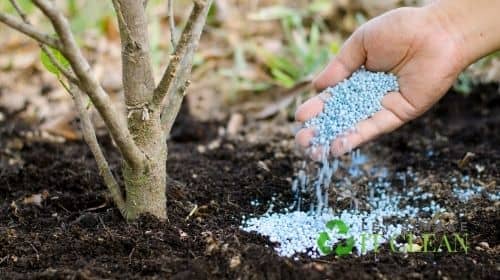
When manufacturers use animal and plant material to make fertilizer, it becomes organic. Manure, bone meal, and compost are some of the organic fertilizers.
Inorganic waste, gasses, and minerals make the organic kind. These inorganic fertilizers may burn plants if used in excess.
Pros of Using Fertilizer
Fertilizer helps your plants grow faster since it takes less time to be effective.
Nutritional elements that a plant needs will be added to your potting soil resulting in higher plant yields.
Deficiencies caused by lack of some nutrients in compost are made available to your soils by fertilizers.
Fertilizers meet the nutrient needs of numerous plant species on your farm.
Cons of Using Fertilizers
Using higher fertilizer application rates than recommended by agricultural specialists puts your farm in danger. You may overload the soil with nutrients resulting in poor crop production.
Gardening with fertilizers pollutes the environment when they run off to water bodies such as rivers and lakes.
A microbial imbalance in the soil is likely when you continuously use fertilizers.
Some chemicals may harm both plants and people who come into contact with them.
What Are the Side Effects of Using Phosphate-based Fertilizers?
Phosphate-based fertilizers provide a vital macronutrient-phosphorus, which helps form robust root systems. It also supports the development of flowers in plants.
When you apply this phosphate-based kind in excess, the following side effects occur:
Water Pollution
Irrigation and rain boost plant growth, but water washes off sometimes. The water that washes off ends up in water bodies and pollutes them. High levels of phosphorus in water bodies become dangerous for aquatic life.
Weeds also grow in the water, floating over the water body. Oxygen levels are going to reduce, destroying the ecosystem.
Sinking Supplies
The application of these chemicals affects your future crop production. Since the supply of rock phosphorus is reducing, your yields are in threat. When the supply finally runs out, your production will reduce dramatically.
Alternatives to Rock Phosphate
Rock phosphate is not your only hope in giving a nutritional helping hand to your plants. You can use bone meal on your farm since it breaks down rapidly.
The fast-breaking down process of bone meal will give your plants more time since it doesn’t have a lot of time to leach out of your garden’s soil.
Greensand is another source of phosphorus for you to use on your farm. It would be best if you control the amounts of organic phosphorus you use on your farm. This is because organic compost also has the power to overwhelm your soil’s micro nutrients holding capacity.
What Are the Benefits of Bat Guano Fertilizer?
Many gardeners may not like bats at all. If you are one of these individuals, using bat guano is an opportunity you need to exploit. People have been harvesting bat guano for years to use as organic fertilizer.
Bat guano helps in improving the growth of plants on a farm. It also improves the soil structure of gardens when applied in reasonable amounts. The downside is that bat guano is expensive.
The long-lasting effect makes it worth buying. Below are the benefits of using bat guano.
Contains Variable Nutrients
Bat guano has nitrogen that promotes the fast growth of plants. When applied to a lawn, the lawn becomes greener, and it grows rapidly.
The fertilizer also contains phosphorus, which promotes the growth of roots. Phosphorus also supports flowering in plants.
Potassium is another important nutrient that facilitates the development of strong stems in plants. Other micronutrients that crops require to be healthy are present in bat guano.
Improves the Soil
Soil texture improves upon the addition of bat guano. The loose soil particles will be held together. Additionally, the dense soil in your garden beds become lighter.
Contrary to inorganic fertilizers that displace readily, bat guano has longer-lasting benefits to your crops. This is because it doesn’t leach easily.
Microbial Action
Bat guano has remedy capabilities because it has microbes. These capabilities clean toxic soil. Consequently, your crops will be healthier, which will help them give you better products.
Microbial activity increases water retention. Air spaces will also increase because the soil becomes looser.
Final Verdict
Whenever you want to decide whether you will use compost or fertilizer, consider the pros and cons discussed in this article. The advantage fertilizer has over compost is how fast it works to amend the soil. As a consequence, plants become healthier and grow more rapidly.
The fertilizers, however, are produced by using synthetic chemicals, which have side effects.
Compost is cheaper since you make your own compost using food waste, kitchen waste, grass clippings, and other readily available materials. Time is the tradeoff in using compost.

